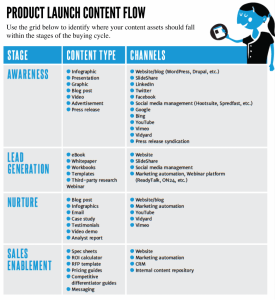Columnist Kerry Jones shares what to look for when vetting content marketing agencies to ensure your partnership is destined for success.

In his recent post about the evolving agency ecosystem, Marketing Land columnist Paul Roetzer said, “Agencies are thriving because the industry is moving too fast for brands to fully internalize the majority of marketing activities.”
As part of this rapid rate of change, we’ve seen the rise of content marketing agencies, which offer attractive solutions for brands that don’t have the resources or in-house talent to produce effective content campaigns.
There is no shortage of brands that are under-skilled and understaffed in content marketing. According to CMI’s B2B Content Marketing report, 34% of marketers cited gaps in their internal team’s skills as a content marketing challenge, while 32% said finding trained candidates with the right skills was difficult.
The content marketing gap goes all the way to the top of an organization, too. Recent research from Smart Insights and TFM&A found that half of senior marketing leaders feel they need deeper content marketing knowledge.
For brands feeling the pressure to up their content game, it’s easy to be swept away by the first agency with an impressive pitch and solid portfolio. Before committing to a company, you need to dig deeper and evaluate your compatibility.
Here’s what to look for in a content marketing agency to ensure you’ll have a successful long-term partnership.
1. They Can Satisfy Your Needs
The key to finding success with content marketing comes from first defining your goals and the needs of the customers you hope to target and then carefully crafting your content to create a value-added link between your goals and your customers’ needs. Before approaching agencies, you should have these goals and needs clearly defined.
Success in one area does not translate to success in any area. Just because an agency is great at getting certain results does not mean it will have success achieving the results you need.
For example, you probably don’t want an agency that only has proven success with viral videos if your brand is already a household name but needs help converting customers toward the end of the buying cycle.
To make sure an agency can meet your needs, be sure to ask:
- What results does the agency share in its case studies? One slam dunk does not mean it can replicate success for you. Look for a variety of case studies showing that it achieved the results you want out of content marketing.
- Who are the agency’s clients? While a homogeneous client base may show a lack of versatility, you should at least recognize some similarities between your company and its clients. For example, if it only has mom-and-pop clients and you’re a large corporation or it seems only to have clients in a vertical that isn’t yours, it may not be a match.
- How is success measured? An agency should have no problem proving its work gets results. Ask how it tracks and reports on content marketing success metrics such as social shares, authoritative links, traffic, subscribers, downloads, purchases, leads, and new customers.

2. They Have The Skills You’re Lacking
One of the biggest incentives for hiring an agency is gaining access to a highly specialized team that has the skills and expertise your team lacks. Trying to hire one person with the skill set of a small agency team is nearly impossible, and building an in-house team would end up costing much more than hiring an agency.
So how can you tell if an agency truly has the skills you need? Staff bios on the agency’s website and LinkedIn profiles will give you insight into a team’s professional and educational backgrounds, but those can also be inflated. For a more objective assessment, look at the following:
- Team roles. While job titles can be misleading (especially in smaller agencies where many hats are worn), it should be obvious where the team’s strengths are based on their roles. Do they have specialists in the areas you need the most help with?
- Testimonials. Pay close attention to what on-site testimonials say about the people doing the work. Do testimonials praise the team’s talents?
- Thought leadership. Review their published work and speaking engagements to see which topics the team covers. Do their articles and presentations show strategic thinking and innovation, or are they just repeating stale content marketing tips? Do they demonstrate subject matter expertise that is complementary to their service offerings?
- LinkedIn recommendations. Again, LinkedIn can be a great tool for assessing skill sets if you look for the right clues. Ignore the skills endorsement feature and instead look at written recommendations. Are the same skills and strengths that the agency touts being mentioned in recommendations?

3. They’re Dedicated To Self-Improvement
An agency that challenges itself to get constantly better is best suited for the fast-paced, ever-changing demands of content marketing. Beware of agencies that appear satisfied with the status quo.
How is the agency committed to improvement, both for the business and its employees? Check for the following:
- Openness to experimenting with new things. Agencies that consistently adopt new platforms and technologies show a desire to keep up with trends and figure out new ways to present and create content.
- A culture of learning. How do employees learn, and how is knowledge shared? A focus on employee training and development, attending conferences and seminars, and encouraging the exchange of ideas among employees (such as internal presentations, workshops, mentorships, etc.) are good signs of a strong learning culture.
- Willingness to correct their course. Look for an agency that is nimble enough to revise a strategy or improve processes when something is no longer effective.
- Evolution in their work. When reviewing the agency’s portfolio, take note how — and if — its work has changed over years. Newer campaigns should show a progression from earlier campaigns.

4. They Have A Track Record Of Healthy Relationships
A trail of disgruntled clients may be a good indicator that an agency has trouble hitting deadlines, managing expectations, delivering results, or all the above. Gauge its client-agency relationships with the following:
- Positive testimonials. Make sure the agency has testimonials from a variety of clients. Look for reviews that don’t just speak of results but also point to the agency being enjoyable or easy to work with.
- Client retention rates. Ask about the average length of client engagements as well as typical reasons that clients leave.
- Referral business. Does the agency have a steady stream of referral business? This shows that others trust the agency to do good work.
Better yet, ask for a list of clients you can speak with — an agency with satisfied clients probably won’t balk at this request.
The relationships that happen inside the agency matter, too. A tumultuous company culture does not bode well for your account, as overworked and miserable employees are unlikely to produce top-notch work.
If you have the chance to visit the agency’s office before signing on, be sure to speak with as many employees as possible to get a feel for their passion and level of satisfaction.
You can also investigate how their employees present themselves on social media (are they their agency’s biggest fans or do they complain about work?) and check employee reviews on Glassdoor for any red flags about the work environment.
5. They Want It To Work Out As Much As You Do
A great agency and a great company are not automatically going to make a great partnership. Experienced agencies know this and are selective about who they work with. They will be honest about which companies they can get results for and which are better off working with a different agency.
You shouldn’t be the only one doing your due diligence during the courting process. Sales calls and pitches should reflect their eagerness to understand your business’ needs and your vertical. Are they asking probing questions specific to your business or general questions that would apply to anyone?
And lastly, watch out for an agency that says nothing but “yes” and seems to have no limits to the volume or type of services it provides. The agency should be open about what it can and can’t do for your business.
Some opinions expressed in this article may be those of a guest author and not necessarily Marketing Land. Staff authors are listed here.
(Some images used under license from Shutterstock.com.)
Marketing Land – Internet Marketing News, Strategies & Tips
(320)







